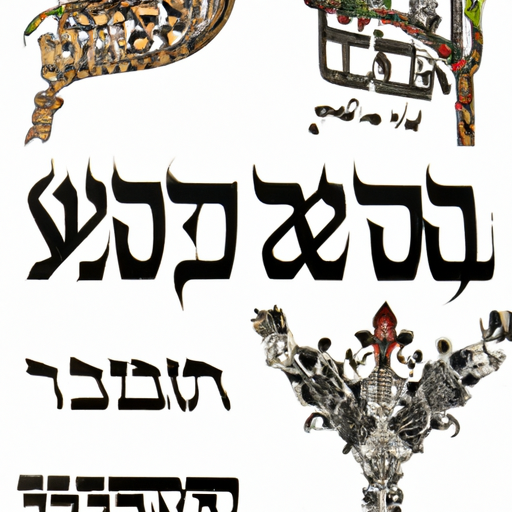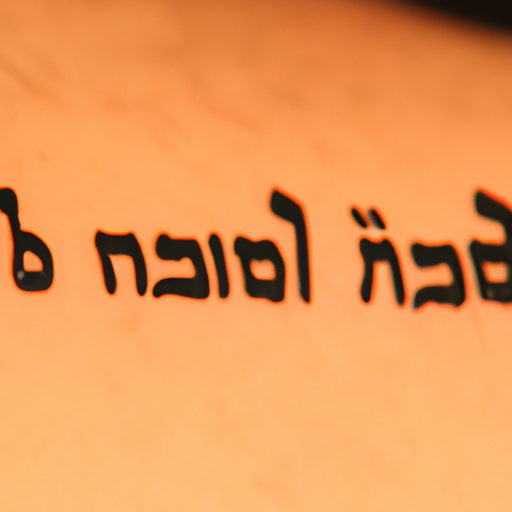This blogpost explores the extensive world of Hebrew tattoo designs, delving into their rich symbolism, cultural significance, and the popular choices among enthusiasts. Discover why these ancient scripts are gaining popularity and what they could mean when etched onto your skin.
Understanding the Popularity of Hebrew Tattoos: Is it just a fad?
In recent years, Hebrew tattoos have gained immense popularity in the world of body art. Many celebrities, influencers, and individuals from different walks of life have been seen proudly displaying Hebrew script on their bodies. But is this trend just a passing fad or does it hold deeper significance?
- 1. Aesthetic Appeal:
One reason for the rise in popularity of Hebrew tattoos is the aesthetic appeal of the Hebrew script itself. The elegant and flowing nature of the characters make for visually stunning designs. The unique calligraphy and intricate lettering make Hebrew tattoos stand out among other tattoo styles, adding a touch of sophistication and mystery. - 2. Cultural and Religious Significance:
Hebrew is an ancient language with deep cultural and religious roots. For many people, getting a Hebrew tattoo is a way to connect with their heritage or express their faith. Hebrew is the language of the Torah, the sacred text of Judaism, and getting a Hebrew tattoo can symbolize one’s commitment to their religious beliefs or serve as a reminder of important values and teachings. - 3. Personal Connection:
Hebrew tattoos also have personal significance for many individuals. They may choose a Hebrew phrase or word that holds sentimental value or represents a significant event or milestone in their lives. The tattoo becomes a permanent reminder of a meaningful experience or a personal mantra.

A collage of popular Hebrew tattoo designs, showcasing the variety and intricacy.
The Symbolism and Meanings behind Hebrew Tattoo Designs: What does your tattoo say about you?
Hebrew tattoo designs are not just visually appealing, but they also carry deep symbolism and meanings. Each Hebrew character holds its own significance, and when combined, they create a powerful message. Understanding the meanings behind Hebrew tattoos can provide insight into the person wearing them and their values.
One of the most common Hebrew tattoo designs is the “chai” symbol, which means “life” in Hebrew. This tattoo represents a celebration of life and a reminder to live each day to the fullest. It can also symbolize resilience and the ability to overcome challenges.
Another popular Hebrew tattoo design is the “hamsa” symbol, also known as the Hand of Miriam. This ancient symbol is believed to bring protection and good fortune. It is often worn as a talisman to ward off evil and promote positivity.
Hebrew words or phrases can also hold significant meanings. For example, the word “emunah” means “faith” in Hebrew. Getting this word tattooed can represent a strong belief in something greater than oneself. It can serve as a reminder to stay steadfast in times of doubt or uncertainty.
The Hebrew word “shalom” is another popular tattoo choice, meaning “peace.” This tattoo can represent a desire for inner peace or a commitment to promoting peace in the world. It can also symbolize harmony and balance in one’s life.
Quote: ‘Ink tells more about oneself than words ever could.’ – Choosing a Hebrew Phrase or Quote for Your Tattoo
Choosing a Hebrew phrase or quote for your tattoo is a deeply personal decision. It allows you to express your beliefs, values, or experiences in a unique and permanent way. As the quote suggests, ink tells more about oneself than words ever could. A Hebrew tattoo can serve as a powerful reminder of who you are and what you stand for.
When selecting a Hebrew phrase or quote for your tattoo, it is essential to consider its meaning and significance to you. It could be a verse from the Torah, a line from a Hebrew prayer, or a meaningful Hebrew saying. Whatever you choose, it should resonate with your personal journey and reflect your identity.
One popular Hebrew phrase for tattoos is “I am my uncle and my uncle is mine,” which translates to “I am my beloved’s, and my beloved is mine.” This phrase is often associated with love and devotion, symbolizing a deep connection between two individuals. It can be a powerful reminder of the love and commitment shared with a partner or a reflection of self-love.
Another option is to choose a Hebrew quote that embodies your values or aspirations. For instance, the quote “Hezek ve Ametz,” meaning “be strong and courageous,” can represent resilience and determination. It can serve as a daily affirmation to overcome challenges and face life’s obstacles with strength and bravery.

A photo of a person’s tattoo, featuring a famous Hebrew quote or phrase.
The Controversy Surrounding Hebrew Tattoos: Is it disrespectful or a form of appreciation?
The popularity of Hebrew tattoos has not been without its fair share of controversy. Some argue that getting a Hebrew tattoo as a non-Jewish person is disrespectful and appropriative, while others view it as a form of appreciation for the beauty and cultural heritage of the Hebrew language. The debate centers around issues of cultural appropriation and the potential for misrepresentation or trivialization of sacred symbols.
One concern raised by critics is the potential for Hebrew tattoos to be taken out of context or misunderstood. Hebrew is a sacred language with deep religious and historical significance to the Jewish community. Using Hebrew characters or phrases without fully understanding their meaning can lead to misinterpretation or even offensive associations. It is important to approach Hebrew tattoos with reverence and respect, seeking guidance from knowledgeable sources to ensure accurate translation and interpretation.
Another aspect of the controversy lies in the potential for cultural appropriation. Cultural appropriation refers to the adoption or borrowing of elements from a culture by members of a dominant culture, often without permission or understanding of the cultural context. Critics argue that non-Jewish individuals getting Hebrew tattoos may be appropriating a religious and cultural symbol without experiencing the full weight of its significance or understanding the historical and cultural context behind it.
However, there are those who argue that Hebrew tattoos can be a form of appreciation and a celebration of the Hebrew language and culture. They believe that by choosing to permanently ink Hebrew characters or phrases on their bodies, individuals are expressing their admiration and connection to the language and its rich heritage. Many people who choose Hebrew tattoos do so after extensive research and consultation with the Jewish community to ensure they are approaching the matter with sensitivity and respect.
Hebrew tattoo designs are more than just an aesthetic choice – they are a profound way of expressing one’s faith, values, or personal philosophy. Whether you choose a design for its spiritual significance, its cultural connection, or purely for its beauty, a Hebrew tattoo can be a deeply meaningful addition to your body art collection.